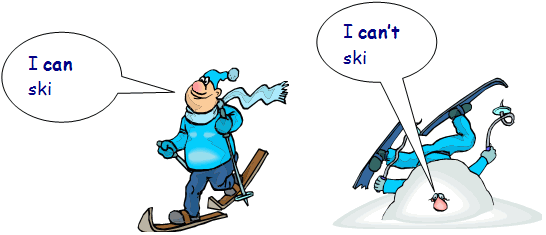Modal Verbs (Ability) – can, could, be able to

I can ski / puedo esquiar
Una de las funciones del verbo modal can es para expresar habilidad.
Podemos utilizar el can si decidimos ahora que vamos hacer en el
futuro.
Ej) I can have lunch with you tomorrow. / Puedo comer contigo mañana.
I can’t see you this weekend. / No puedo verte esta fin de semana.
|
Nota:
Después del can ponemos el infinitivo sin to
... can play tennis |
|
La forma negativa completa se
escribe como una sola palabra; cannot. Podemos utilizar el could
para decir podría (would be able to) |
EJERCICIOS
· Elije can o
can’t si es posible. Si no, elige could o
will be able to.
1. I’m sorry, I take you to the
airport in the morning because I’ve got a business meeting at 9 o’clock.
2. I think I pass my driving test
before my 50th birthday.
3. One day in the future I think we
live on the moon.
4. If we left now, we before the
shops close.
5. I’m not working this weekend so we
go cycling on Sunday.
6. I meet you for coffee at 11, but
I’ll only have fifteen minutes.
7. I’ll do the washing and the ironing, but I
do the shopping.
8. If we worked together, we finish
it before the film starts.
9. She was bad after the accident, but I think she
go back to work next week.
10. It’s not possible yet, but I think computers
do the housework for us in a few
years.
11. I go for a run this evening. My
parents are coming to visit and I won’t have time.
12. I do your job. It’s so
complicated and stressful.
|
Help:
to pass = aprobar |
¡OJO!
No utilizamos el could cuando hemos conseguido hacer algo por
algo una sola vez. En estas ocasiones decimos managed to o
succeeded in.
|
Ej.) It wasn’t easy, but I |
|
|
managed to succeeded in buying |
|
| No fue fácil, pero conseguí comprar una entrada para el concierto de Eminem. | |
EJERCICIOS
· Elige could, couldn’t o managed to
1. I play the piano when I was four.
2. They to get to the top of Mt.
Kilimanjaro, but it took them six days.
3. Eventually Luis convince me that
there’s no future in teaching English.
4. Mark wanted to see the final of the European Cup, but he
get tickets.
5. Henry was so advanced for his age that he
burn music CD’s when he was 8
months old.
6. Val and John were amazed that they
to drive over the Pyrenees in such
an old car.
7. I spoke to her for more than an hour, bought her a drink, and finally
get her phone number.
8. Carlos speak English when he was
six years old. His parents are from Liverpool.
9. Cathy grew up near the beach in South Africa. She
swim, sail and dive when she was
very young.
10. Danny lost his job at the clock factory because he
get up on time in the mornings.
|
Help:
sail = paseo en barco |
Modal Verbs – can, should, must

Relaciona las frases con sus significados:
1. I think you should marry him. He’s very sexy!
2. You can marry him if you really love him.
3. You shouldn’t marry him because you don’t love him.
4. You can’t marry him, he’s already married!
5. You must marry him, you’re pregnant!*
6. You mustn’t marry him. If you do it’ll be the biggest mistake of your
life!
*pregnant = embarazada
Ahora escribe must/mustn’t/should/shouldn’t/can
o can’t en el espacio adecuado.
1. Se utiliza para decir que algo
es posible.
2. Se utiliza para decir que algo
no es posible.
3. Se utiliza para aconsejar a
alguien hacer algo.
4. Se utiliza para aconsejar a
alguien no hacer algo.
5. Se utiliza para ordenar a
alguien hacer algo.
6. Se utiliza para ordenar a
alguien hacer algo.
![]()
*También te puede interesar:
La Mansión del Inglés. https://www.mansioningles.com
© Copyright La Mansión del Inglés C.B. - Todos los Derechos Reservados . -

¿Cómo puedo desactivar el bloqueo de anuncios en La Mansión del Inglés?



